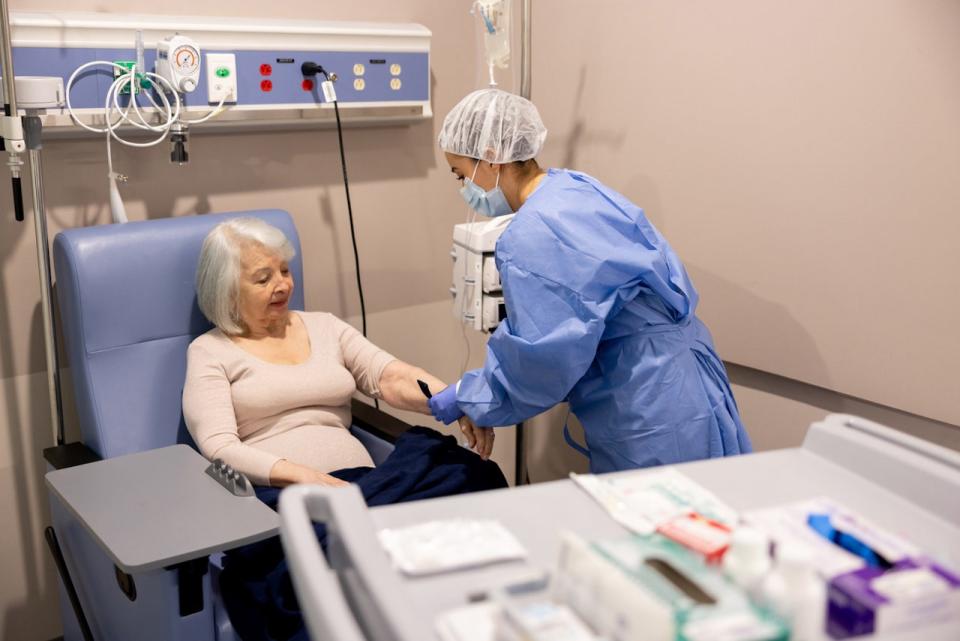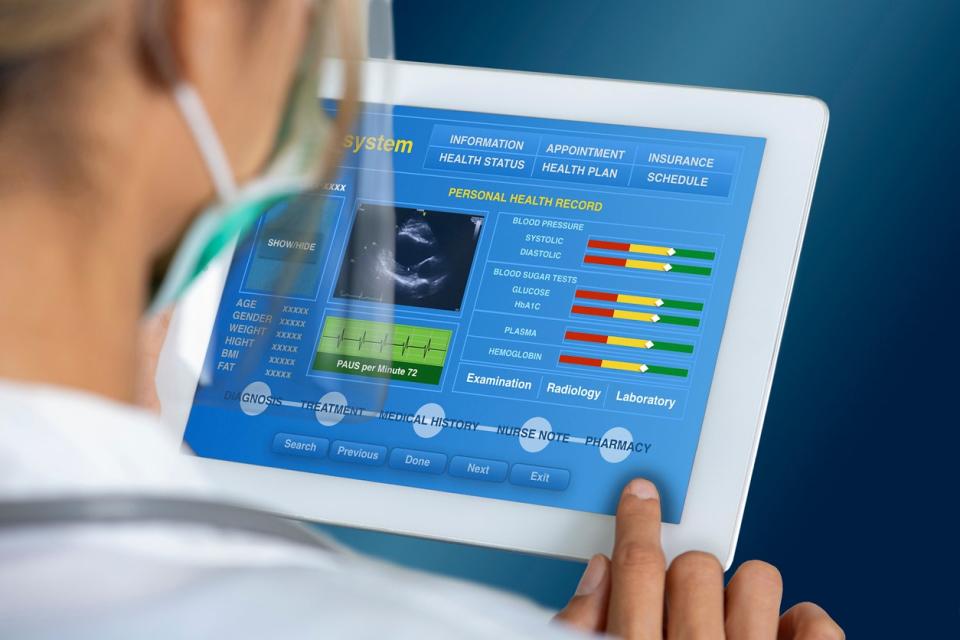AI could predict whether cancer treatments will work, experts say: ‘Exciting time in medicine'

A chemotherapy alternative called immunotherapy is showing promise in treating cancer — and a new artificial intelligence tool could help ensure that patients have the best possible experience.
Immunotherapy, first approved in 2011, uses the cancer patient’s own immune system to target and fight cancer.
While it doesn’t work for everyone, for the 15% to 20% who do see results, it can be life-saving.
WHAT IS ARTIFICIAL INTELLIGENCE (AI)?
Like any medication, immunotherapy has the potential for adverse side effects — which can be severe for some.
Studies show that some 10% to 15% of patients develop "significant toxicities."

Headquartered in Chicago, GE HealthCare — working in tandem with Vanderbilt University Medical Center (VUMC) in Nashville, Tennessee — has created an AI model that's designed to help remove some of the uncertainties surrounding immunotherapy.
Over the five years it’s been in development, the AI model was trained on thousands of patients’ electronic health records (EHRs) to recognize patterns in how they responded to immunotherapy, focusing on safety and effectiveness.
AI MODEL COULD HELP PREDICT LUNG CANCER RISKS IN NON-SMOKERS, STUDY FINDS: ‘SIGNIFICANT ADVANCEMENT’
"The model predicts which patients are likely to derive the benefit from immunotherapy versus those patients who may not," said Jan Wolber, global digital product leader at GE HealthCare’s pharmaceutical diagnostics segment, in an interview with Fox News Digital.
"It also predicts which patients have a likelihood of developing one or more significant toxicities."
When pulling data from the patient’s health record, the model looks at demographic information, imaging scans, preexisting diagnoses, lifestyle habits (such as smoking), medication history and more.

"All of these data are already being collected by the patient’s oncologist, or they’re filling out a form in the waiting room ahead of time," said Travis Osterman, a medical oncologist and associate chief medical information officer at Vanderbilt University Medical Center, in an interview with Fox News Digital.
(Osterman is working with Wolber on the development of the AI model.)
BREAST CANCER BREAKTHROUGH: AI PREDICTS A THIRD OF CASES PRIOR TO DIAGNOSIS IN MAMMOGRAPHY STUDY
"We're not asking for additional blood samples or complex imaging. These are all data points that we're already collecting — vital signs, diagnoses, lab values, those sorts of things."
In a study, the AI model showed 70% to 80% accuracy in predicting patients’ responses to immunotherapies, according to an article published in the Journal of Clinical Oncology Clinical Cancer Informatics.
"While the models are not perfect, this is actually a very good result," Wolber said. "We can implement those models with very little additional effort because there are no additional measurements required in the clinic."
This type of technology is "a natural progression of what we've been doing in medicine for a very long time," Osterman said.
"The only difference is, instead of surveying patients, we're taking the entirety of the medical record and looking for risk factors that contribute to an outcome," he said in an interview with Fox News Digital.

With immunotherapy, there is generally a lower response rate than with chemotherapy, Osterman noted — but some patients have "incredible responses" and ultimately become cancer-free.
"I would be horrified to know that one of my patients that I didn't give immunotherapy to could have been one of the tremendous responders," he told Fox News Digital.
Conversely, Osterman noted that in rare cases, immunotherapy can have some serious side effects.
"I would say about half of patients don't have any side effects, but for those who do, some of them are really life-altering," he said.
"We don't want to miss anyone, but we also don't want to harm anyone."
At the core of the AI project, Osterman said, is the ability to "put all the information into the exam room," so the oncologist can counsel the patient about the risks and benefits of this particular therapy and make the best, most informed decision about their care.
Dr. Marc Siegel, clinical professor of medicine at NYU Langone Medical Center and a Fox News medical contributor, was not involved in the AI model’s development but commented on its potential.
"AI models are emerging that are helping to manage responses to cancer treatments," he told Fox News Digital.

"These can allow for more treatment options and be more predictive of outcome."
AI models like this one are an example of "the essential future of personalized medicine," Siegel said, "where each patient is approached differently and their cancer is analyzed and treated with precision using genetic and protein analysis."
As long as physicians and scientists remain in charge — "not a computer or robot" — Siegel said that "there is no downside."
The AI model does carry some degree of limitations, the experts acknowledged.
"The models obviously do not return 100% accuracy," Wolber told Fox News Digital. "So there are some so-called false positives or false negatives."
NEW AI ‘CANCER CHATBOT’ PROVIDES PATIENTS AND FAMILIES WITH 24/7 SUPPORT: 'EMPATHETIC APPROACH'
The tool is not a "black box" that will provide a surefire answer, he noted. Rather, it's a tool that provides data points to the clinician and informs them as they make patient management decisions.
Osterman pointed out that the AI model uses a "relatively small dataset."
"We would love to be able to refine our predictions by learning on bigger data sets," he said.

The team is currently looking for partnerships that will enable them to test the AI model in new settings and achieve even higher accuracy in its predictions.
Another challenge, Osterman said, is the need to integrate these AI recommendations into the workflow.
"This is pretty new for us as a health care community, and I think we're all going to be wrestling with that question," he said.
CLICK HERE TO SIGN UP FOR OUR HEALTH NEWSLETTER
Looking ahead, once the AI model has achieved the necessary regulatory approvals, GE HealthCare plans to make the technology available for widespread use by clinicians — perhaps even expanding to other care areas, such as neurology or cardiology.
There is also the potential to incorporate it into drug development.
"One of the things that drug makers struggle with is that some of the agents that may be really useful for some patients could be really toxic for others," Osterman said.
"If they were able to pick which patients could go into a trial and exclude patients with the highest risk of toxicity, that could mean the difference between that drug being made available or not."
He added, "If this means that we're able to help tailor that precision risk to patients, I'm in favor of that."
Ultimately, Osterman said, "it's a really exciting time to be in medicine … I think we're going to look back and regard this as the golden age of AI recommendations. I think they're probably here to stay."
For more Health articles, visit www.foxnews/health.
Original article source: AI could predict whether cancer treatments will work, experts say: ‘Exciting time in medicine'

